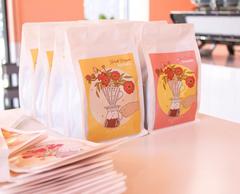The secret sauce for sustainability in the coffee industry
‘For Floozy, specialty coffee is coffee that is sourced with traceability and transparency. Coffee that doesn’t fuck anyone over’
– KMac – Floozy Coffee Roaster
To ensure you guys have the best Camp Grounds experience possible, I sat down with KMac to get yours (and my) most asked questions answered. Once we got over the excitement of seeing each other’s faces and working out who had the mute on, (oh the joys of Zoom) we got right to it.
How did you come up with the name Floozy?
KMac: So the concept when we started it was to be a space for equality and for women to be able to exist in the same space as men in the roasting industry, which wasn’t really a thing a few years ago.
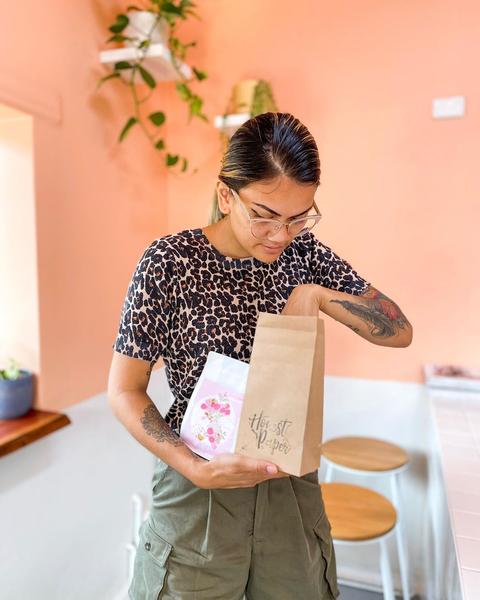
So when the name came up, it was literally googling ‘bad words for women’ and then going through the list and picking which one I liked the best. The idea was to take back a word that was considered ‘bad’.
MP: To change the meaning of it?
KM: Yeah essentially. Another part is people take it so seriously, and the names are also very serious. It’s something totally not to do with coffee, something fun and that we can have fun with as a brand.
We are serious about coffee, but not in a way that alienates people who just want to have fun and drink really delicious coffee!
What does it mean to Floozy to choose women producers of coffee?
KM: Different laws exist in different countries, such as women not being able to hold land titles. In a country like this, we are so lucky to be able to, and that concept is foreign to me. You either inherit the land or your husband owns it. So to kind of bring light to women in coffee I think it’s really important to say that this is the woman behind it. Not to mention the fact that they are producing really delicious coffee so there’s kind of two elements to it.
I have to also ensure that the coffee is really delicious as well.
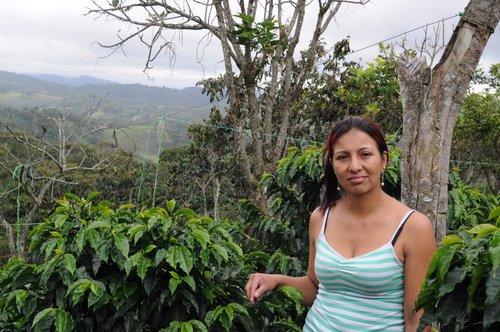
No matter if the producer is male, female or ungendered, in order to get good quality you pay higher prices, therefore you’re making sure people are being paid well.
If we are sourcing it and trying to get a level of transparency, no matter who the producer is, it’s going to taste better because they are putting more quality into their processing techniques. It’s so important to me to have the traceability to find these women producers.
When the company wasn’t big enough, I didn’t have the ability to find these amazing women producers. Now that we have grown, it means that I can commit to a women’s full lot of coffee. So for Sonia Imbachi, (pictured above) who you’ve had on your espresso, I agreed that we would purchase her coffee for an entire year so anything that she produced we would purchase.
It’s good for everyone because if I get her best quality coffee, she gets paid the most, and we also get this amazingly delicious coffee.
I don’t remember what the question was, (laughs), but it means the coffee she’s producing is confirmed. I think that’s really important, to guarantee something that takes a long time to produce, like coffee, and to be able to say ‘I’m going to sell everything i make this year’ and that’s pretty awesome.
MP:That’s so cool! It helps you remember that so much goes into your morning cup of coffee.
What is specialty coffee?
KM:How would I define specialty coffee? It’s hard to sum up. There’s no restrictions on using the word. I can get coffee from anywhere. I can grow it from my backyard and call it specialty coffee and nobody could get angry at me because there’s no laws around that.
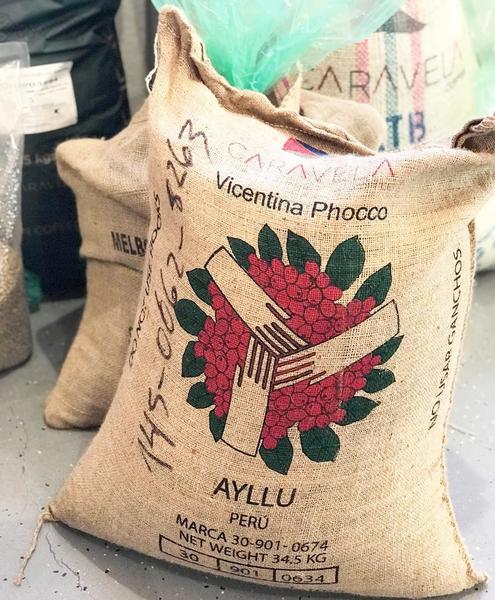
I actually am trying to grow coffee in my backyard right now by the way..
MP: No way! How’s it going?
KM: I’m not good at it! (both laugh).
For Floozy specialty coffee is coffee that is sourced with traceability and transparently. Coffee that doesn’t fuck anyone over.
MP: Great way of putting it!
KM: Say you’re a coffee roaster, and say you have a Geisha, and you’ve got that on your website, it’s great, it’s delicious, but then in your blend you’ve snuck in this commodity grade coffee, but you’re a specialty coffee roaster, hmm.. I don’t really know about that. So that’s where the issue lies.
We don’t sell or deal with anything commodity market wise
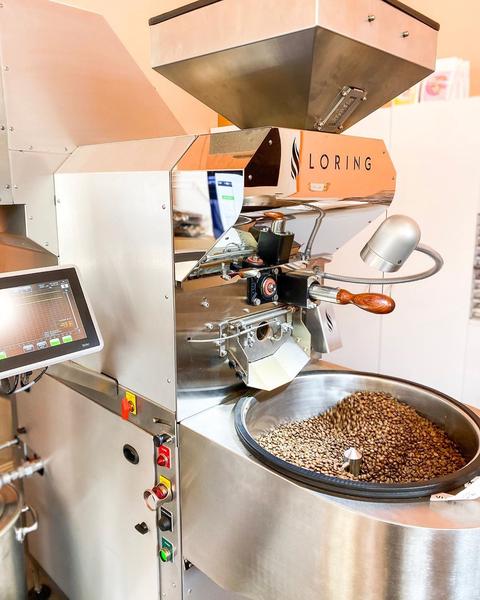
MP: So when people become lax in what they are choosing to sell, and what they are choosing to be known for, that’s when the quality is coming down?
KM: Yeah. You can say about yourself that you have really high quality coffee but you also have really low quality coffees. So is that the way to go forward transparently and sustainably in the industry? To sell these super crazy, high quality coffees that a producer may only have one bag of, and then buy really low quality coffee for the majority of your roasting work? I don’t think that that’s the way forward.
For me I would much rather have a medium coffee and buy that producer’s entire harvest of it.
I think that’s more sustainable for a producer and for me. And for consumer consistency.
MP: That makes a lot of sense!
Alright, an easier one;
What is the difference between a washed and a natural coffee?
KM: You have a coffee cherry that grows from a tree, and the bean is actually the pair of seeds inside the coffee cherry. (Washed coffee) The coffee cherries are depulped, washed in the wash process and before the coffee seed gets dried, it is completely washed. This creates a cleaner tasting coffee.
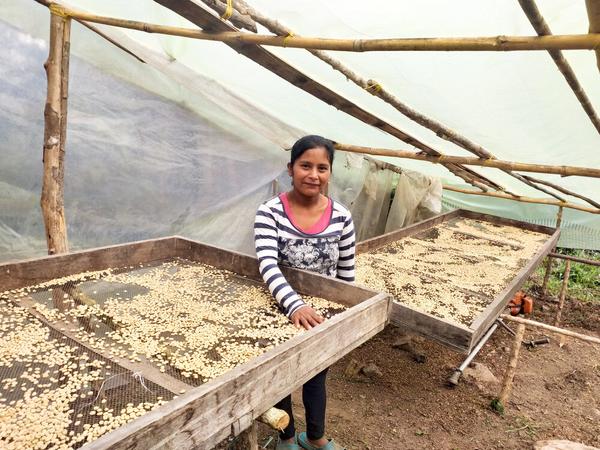
A natural process is where the cherry is left on the seed, and dried while it ferments off. Something that people love about natural coffees, is because of that process of fermentation, it makes the taste really fruity and sometimes a little funky.
For me, you didn’t ask this question but I’m going to tell you anyway (laughs); My preference is for washed coffee. I really enjoy the subtlety and complexity of the cup.
How do you make the flavour profiles for the coffee?
KM: It has more to do with the inherent properties of particular coffee beans rather than what I do to them when roasting.
The easiest way to describe it is more towards wine. So we know that different grape varietals have different inherent flavours and such. It’s similar with coffee. There are so many different varieties of coffee and so many different growing regions for it.
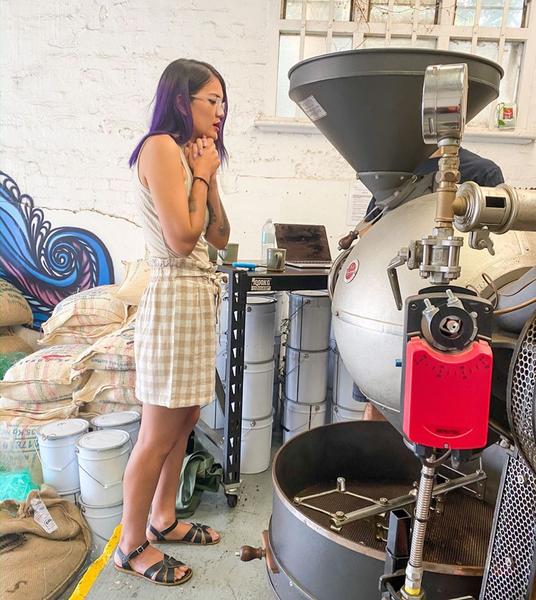
For example, in the blend you have on espresso at the moment, the Brazil is a pulped natural process, and that bean itself has flavour profiles of a very chocolatey nature. The pulped natural gives it more of a funk and richness to it. Then we have Nicaraguan. It’s quite nutty, so the combination of those things gets that profile. By putting coffees together, I can anticipate what I think the blend might taste like, and then match them up. So I can roast it lighter for filter and usually hold onto some of the acidity, or more of the lighter floral tasting notes. Or, I can roast it a little more developed for espresso or a milk roast where I might end up with richer, rounder, more chocolatey flavour notes.
I can’t fabricate the taste. I can’t buy a coffee and be like ‘I’m going to make it taste like chocolate ice-cream’.
MP: So there’s nothing being added to it, it’s just the inherent flavour of the beans that you are roasting at different levels, in order to bring out the best flavour?
KM: Yeah!
What is the process from the farm, to our cup?
KM: A majority of our coffees we purchase with a coffee merchant called Caravela. I will say to our merchant, ‘I need X amount of Columbian coffee this year from female producers’. They will then set us up in the Las Mingas program, meaning ‘for the good of all’.
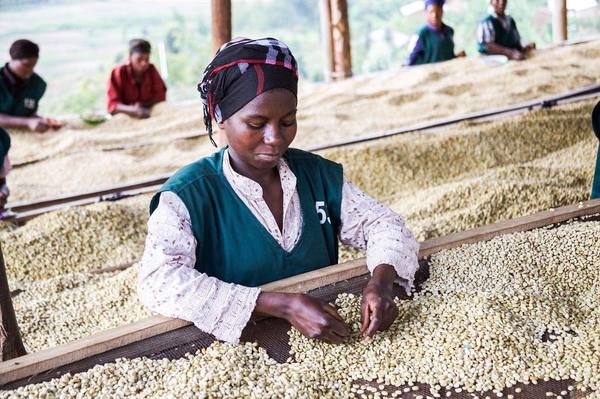
Process of coffee from farm to roaster
- Our merchants will link me up with producers they think will suit.
- They will grow their coffee.
- Samples arrive for us to cup.
- Once approved (depending on the harvest schedule), it will end up on a boat through Caravela exporting it for us.
- It comes to me and I roast it.
That is a very simplified version but essentially how it works. I believe really strongly in using a good reputable merchant like Caravela. I like using a merchant who has the facilities to help these people with real questions concerning their farm.
I love our (coffee) merchants so much and respect their portion of the supply chain.
What do you think is the best at home brewing technique?
MP: Especially now with many people in isolation or unable to acquire coffee?
KM: I really like the French Press. Mostly because they are so easy to use. It can make all types of coffees and a good amount, if there are a few people in the household. If it’s just for me though, I’ll make a V60 pour over.
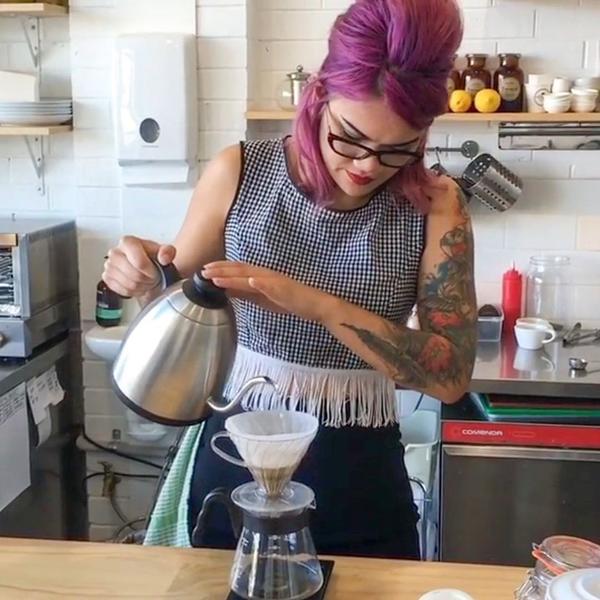
How do you think coffee has evolved in the last couple of years?
KM: The main changes I’ve noticed are consumers being more aware of what they are drinking and how it’s sourced. Even just things like bringing keep cups. With the sustainability side of coffee, people are becoming much more aware of the fact that as an industry, we can do better than we have been with sourcing sustainably. Choosing to be more sustainable with things like making our bags are soft plastic recyclable, and your (Camp Grounds) cups which are fully compostable. All of these things are just due to a lot of people’s awareness in general.

MP: So the educational side?
KM: The acceptability of what is okay and what isn’t. Is it okay to pick up a bag that just says ‘Columbia’ on it and be like ‘Yep! That’s traceable to Columbia!?’
MP: People want to know more about what they’re doing. I think it’s good for businesses. If they keep getting questions surrounding sustainability and traceability, then they are going to realise that this is what people want.They will have to adapt to continue their business.
KM: Product is out there that’s the thing. I think there’s an unacceptability of it. Why are you not using a compostable takeaway cup when the product exists? Cost can potentially come into it too, but I think they are pretty comparable these days.
MP: What’s going on in the world of Floozy right now? Anything exciting on the horizon?
KM: I’m pretty excited about some of the coffee we are sourcing this year. Obviously with everything going on in the world, it’s hard to be like ‘what’s exciting’, but as a result of it, the amount of people who are now brewing coffee at home are interested in having a different variety which is great! I’ve started to come up with doing a few super special releases of coffee, so we are doing some fun stuff with cupping right now. It’s always exciting to roast and try new things so that’s what I’ll be doing!
MP: Matt told me that we will be doing a CampGrounds/ Floozy collab?!
KM: Yes! It’ll be so much fun! We will have to play it by ear with dates and such, but hopefully we can soon! Can’t wait to come back to Tamworth!
MP: Awesome! We can’t wait to see the Floozy fam!
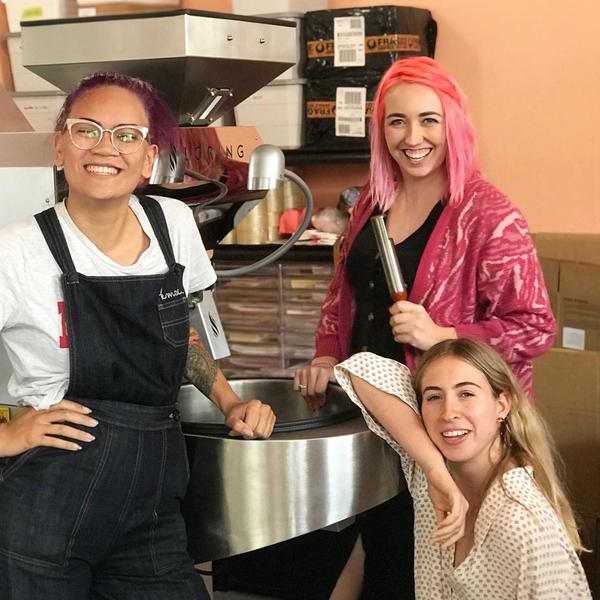
Wanna taste of Floozy beans?!
